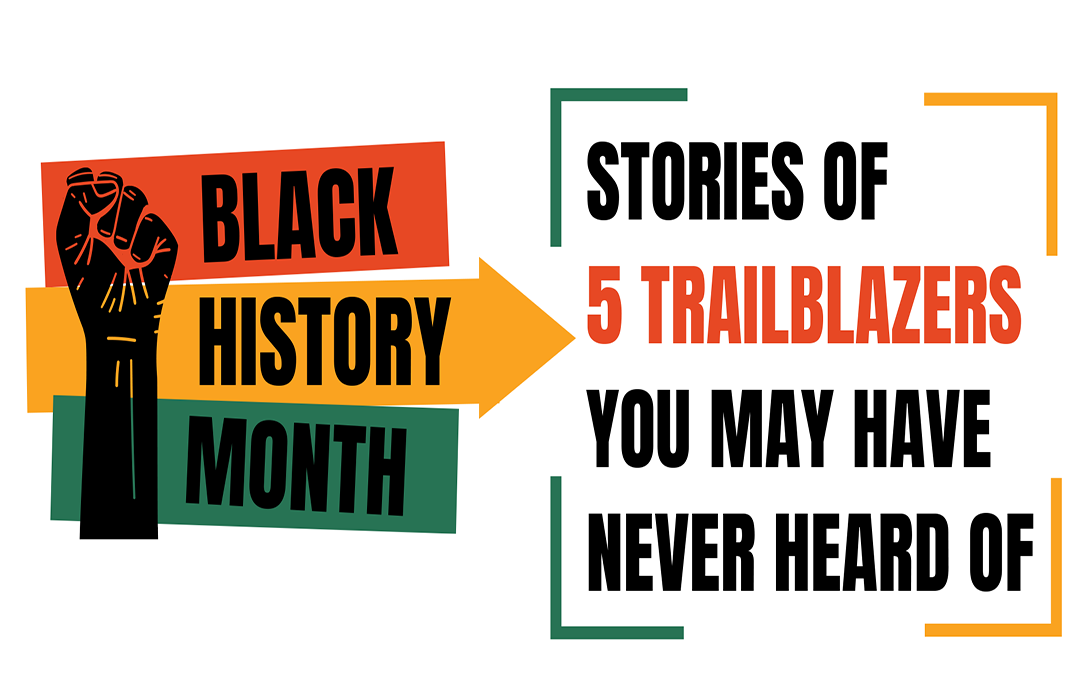When you think of pioneers in African American history, who comes to mind? For most of us, it’s leaders like Dr. Martin Luther King, Jr., Rosa Parks, Maya Angelou, and James Baldwin – and rightfully so. But, if names like Bayard Rustin, Bessie Coleman, and Jane Bolin don’t ring a bell, you’re not alone. In honor of Black History Month, here’s an opportunity to learn about lesser-known activists, adventurers, and educators who enriched the American culture by following their calling – often breaking barriers for those who rose to fame in more recent history.

1. Bayard Rustin, a Minority Within a Minority. Dr. King is usually credited for the March on Washington in August 1963. But it was Rustin who organized and strategized in the shadows. As a gay man who had controversial ties to communism, he was considered too much of a liability to be on the front lines of the movement. Nonetheless, he was one of the most brilliant minds, and served his community tirelessly while pushing for more jobs and better wages.
Learn more: Brother Outsider: The Life of Bayard Rustin (Amazon Books)
We are all one – and if we don’t know it, we will learn it the hard way.

2. Bessie Coleman, First African American Licensed Pilot. Despite being the first licensed Black pilot in the world, Coleman wasn’t recognized as a pioneer in aviation until after her death. Though history has favored Amelia Earhart or the Wright brothers, Coleman—who went to flight school in France in 1919—paved the way for a new generation of diverse fliers like the Tuskegee airmen, Blackbirds, and Flying Hobos.
Learn more: The Legend: The Bessie Coleman Story (Amazon Prime)
It’s when we forget ourselves that we accomplish tasks that are most likely to be remembered.

3. Gordon Parks, One of the Greatest Photographers of the 20th Century and Deeply Committed Humanitarian. Parks was the first African American on the staff of LIFE magazine, and later he would be responsible for some of the most beautiful imagery in the pages of Vogue. He also was the first Black director of a major film,Shaft, helping to shape the blaxploitation era in the 1970s.
Learn more: Half Passed Autumn: Life and Times of Gordon Parks (Vimeo)
I saw that the camera could be a weapon against poverty, against racism, against all sorts of social wrongs. I knew at that point I had to have a camera.

4. Judge Jane Bolin, First Black Woman to Attend Yale Law School and Outspoken Public Figure before the Civil Rights Movement. A pioneer in law, Jane Bolin was the first Black woman to attend Yale Law School in 1931. In 1939, she became the first Black female judge in the United States, where she served for 10 years. One of her significant contributions was working with private employers to hire people based on their skills, as opposed to discriminating against them because of their race. She also served on the boards of the NAACP, Child Welfare League of America, and the Neighborhood Children’s Center.
Learn more: Daughter of the Empire State: The Life of Judge Jane Bolin (Amazon Books)
I am always impatient with those who say, ‘You women have come a long way.’ Since I am no gradualist I think to myself that 150 years is too long a time to come ‘a long way’ in that those gains we have made were never graciously and generously granted.

5. Marsha P. Johnson, Trans Activist and Pioneer Who Was a Force Behind the Stonewall Riots. Marsha (Pay It No Mind) Johnson was an activist, a sex worker, a drag performer, and a model for Andy Warhol. She was at the forefront of pivotal moments in modern history. She established one of America’s first safe spaces for transgender and homeless youth, Street Transvestite Action Revolutionaries (STAR). She tirelessly advocated on behalf of sex workers, prisoners, and people with HIV/AIDS.
Learn more: The Death and Life of Marsha P. Johnson (Netflix)
How many years has it taken people to realize that we are all brothers and sisters and human beings in the human race?
If you’d like to hear more stories to celebrate Black History Month, listen to this beautiful StoryCorps collection featuring Black voices in conversation.
Question: What stories would you want to see elevated in the narrative of American history?
Driven by the premise that excellence is the result of aligning people, purpose and performance, Center for Executive Excellence facilitates training in leading self, leading teams and leading organizations. To learn more, subscribe to receive CEE News!




